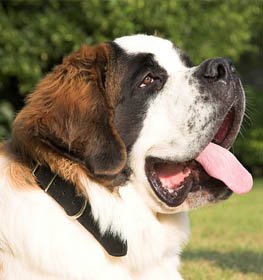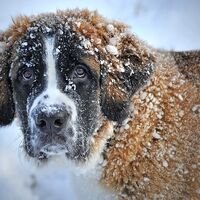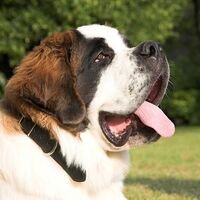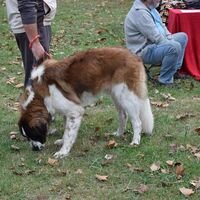St. Bernard Information & Dog Breed Facts
Collection of all the general dog breed info about St. Bernard so you can get to know the breed more.
| Group | Working Dogs |
|---|---|
| Popularity Rank | 48 |
| Reviews | 9 |
| User Ratings | |
|
Compare the St. Bernard With Other Dogs
Select at least one dog breed to make the comparsion. | |
 | |
| Origin | |
|
Common Names & Aliases
What other names is a St. Bernard known by? Discover all traditional, regional and informal names used for this breed. | Alpine MastiffBernhardinerSt. BarnhardshundSt. BernardSaint |
|---|---|
|
Breed Classification
What type of dog breed is a St. Bernard? Learn about its genetic classification and breeding category. | Purebred |
Photo Gallery of the St. Bernard Breed
|
Size Classification
What size category is a St. Bernard? Learn how big the St. Bernard breed typically grows. | Giant |
|---|---|
|
Weight Statistics
How much does a St. Bernard weigh? Discover typical weight ranges for adult males and females of the St. Bernard breed. | 110-200 pounds (50-91 kg) |
|
Average Weight
What is the average weight of a St. Bernard? | 155 pounds (70.5 kg) |
|
Height
How tall is the St. Bernard? St. Bernard height: | 25.5-27.5 inches (61-70 cm) |
|
Average Height
What is the average height of a St. Bernard? | 25.5-27.5 inches (65.5 cm) |
|
Price Range
How much does a St. Bernard puppy cost? Find current market prices and factors affecting St. Bernard costs. | $1500-$1800 If you choose to purchase the St. Bernard, you should know that the mentioned amount of money is an average of the collected data from breeders’ sites and puppy finder places. If you have a St. Bernard for sale, please advertise it on a reliable website to make sure the St. Bernard gets to a happy place. |
|---|---|
|
Availability
How easy is it to get a St. Bernard? How many St. Bernard are there in the world? | Very frequent: The St. Bernard is quite easy to get. There is a risk of overbreeding, as it is an extremely popular breed. Inbreeding is common because of its popularity. A new study suggests that inbreeding contributes to the incidence of disease and health problems. So be careful, buy from a trustworthy place or kennel and seek the help of an experienced person, a professional, to make the right decision. |
|
Intelligence Rating
How intelligent is a St. Bernard? Discover the St. Bernard's intelligence ranking and learning capabilities. | Low to average: This canine intelligence is not the brightest one. Keep in mind that if you want to teach them any tricks, they understand and memorize new commands in 40-80 repetitions. St. Bernard obey the first command 30% of the time or better. So if you want to have a smart dog, you might have to reconsider your choice with this breed.
The St. Bernard ranks below average in the intelligence ranking of dogs. |
|---|---|
|
Training Difficulty
How easy is it to train a St. Bernard? Learn about the St. Bernard's trainability and response to training methods. | A slightly harder to train than average. St. Bernard dogs aren't famous for their trainability. This breed needs more time and repetition to obey. It's challenging to teach them new commands, but not impossible. |
|
Watchdog Rating
How good is a St. Bernard as a watchdog? Learn about the St. Bernard's alertness and guarding instincts. | St. Bernard dogs are average watchdogs. If they sense something different, they will alert you, but observation isn't considered their main job.
|
|
Territorial Protection
Is a St. Bernard protective of its territory? Learn about the St. Bernard's guarding instincts and behavior. | St. Bernard dogs strongly protect their territory. This breed is a complete security guard, so you don't have to be afraid in case of danger. |
|
Personality Traits
What personality does a St. Bernard have? Learn about characteristic St. Bernard temperament and behavior traits. | IndependentHappyFriendlyGentleGoingSocialQuiet |
|---|---|
|
Sensitivity Level
How sensitive are they? St. Bernard sensitivity: | Sensitive: St. Bernard dogs don't like an irregular daily routine, noisy household, and frequent guest visits.
This breed's emotional level reflects their owner's feelings and they don't handle punishments well. |
|
Affection Level
How affectionate are they? Is a St. Bernard a good family dog? | High: St. Bernard dogs are genuinely loyal, soft and gentle, loving, and affectionate dogs toward their handlers. They enjoy quality time with their owners despite the activity and are considered great therapy dogs for those in need. This breed responds strongly to their handler's emotions because they bond closely. Their happiness is your happiness. |
|
Social Needs
How much social interaction does the Alpine Mastiff need? St. Bernard social needs: | St. Bernard dogs need a lot of social interaction. They desire to always be with someone or around people. This breed hates being left alone. |
|
Impulse to Wander or Roam
How likely is the St. Bernard to run away? Does this breed explore or wander a lot? Does St. Bernard roam? | St. Bernard dogs are not the biggest explorers. They have low wanderlust potential. Low chance of escaping from home with this breed. |
|
Prey Drive
Do this canine have a strong prey drive? Does St. Bernard have high prey drive? | Their prey drive is low. St. Bernard dogs don't have an impulse to catch or chase small animals. |
|
Barking Frequency
Does a St. Bernard bark a lot? Learn about typical St. Bernard vocalization patterns and triggers. | Low: The St. Bernard barks none to minimal. Perfect choice if you prefer a quiet breed.
Top reasons for barking: protection, alarm, fear, boredom, attention-seeking, greeting, separation anxiety, compulsive barking. |
|---|---|
|
Playful Nature
How playful is a St. Bernard? Understand the typical play drive and energy level of the St. Bernard breed. | St. Bernards are not the most playful dog breed. Sometimes they do like playing, but that's not their favorite activity. |
|
Apartment Adaptability
Can a St. Bernard live in an apartment? Learn about the St. Bernard's suitability for apartment living. | It is not the best choice if you want to keep them indoors, however, with careful exercise and several walks a day, they will tolerate the indoor environment, so it is possible to keep St. Bernard indoors. |
|
Lifestyle Adaptability
How adaptable is a St. Bernard to lifestyle changes? Learn about the St. Bernard's flexibility to new situations. | St. Bernard dogs adapt well to lifestyle changes and different living environments. They don't mind moving from one place to another with their owner. |
|---|---|
|
Alone Time Tolerance
Can a St. Bernard be left alone? Learn about the St. Bernard's tolerance to solitude. | St. Bernard dogs tend to have separation anxiety when their owners left them alone at home because they bond very closely with them. |
|
Bite Risk Assessment
What is a St. Bernard biting potential? Learn about the St. Bernard's bite risk factors. | Moderate ⏺ The St. Bernard has an average chance of biting somebody. Top reasons for dog bite: protection, pain, excitement, herding instinct, being provoked. (Data based on the available online bite statistics.) |
|---|---|
|
Mouthing Tendency
Is a St. Bernard mouthy? Learn about the St. Bernard's tendency to use mouth during play. | St. Bernard dogs have a low tendency to nip, chew, play-bite, or herd people. It's a common habit during puppyhood, not aggressive behavior. These "bites" don't hurt, but St. Bernard dogs need to be taught a good attitude. |
|
Bite Strength Rating
How strong is a St. Bernard bite? Learn about the St. Bernard's bite force measured in PSI. | Above 400 PSI 🔼 St. Bernard bite force: The Strongest. The St. Bernard bite force is among the strongest in the canine world. The bite force St. Bernard measurements are typically quite high, which is a testament to their powerful and large stature. The bite force of St. Bernard dogs is impressive, and their St. Bernard bite PSI is reflective of their powerful nature.
The St. Bernard PSI bite should be respected, and appropriate precautions should be taken when interacting with these dogs. The PSI of a St. Bernard bite is high, making them one of the strongest breeds in terms of bite force. They are very protective of themselves and their families, therefore a dog bite from them could be exceptionally dangerous with their PSI being above 400. To ensure a well-behaved and controlled dog, it's important to learn how to train a St. Bernard puppy not to bite from an early age. It is important that they’re trained to be around others safely. |
|
Average Lifespan
How long does a St. Bernard live? Learn about the typical lifespan of the St. Bernard breed. | 8-10 years The average lifespan of St. Bernard: 9 years |
|---|---|
|
Climate Tolerance
How well does a St. Bernard handle different weather? Learn about the St. Bernard's climate adaptability. | Tolerates warm and cold weather Dogs that tolerate hot and cold weather are typically those that have a double coat of fur. Dogs with a double coat of fur have a layer of fur that insulates their skin and helps protect them from the cold and the heat. |
|
Health Concerns
What health issues are common in a St. Bernard? Discover typical conditions affecting the St. Bernard breed. | Very healthy dog breed. The St. Bernard rarely meets with the veterinarian. |
|
Vet Care Frequency
How often does a St. Bernard need vet visits? Learn about the St. Bernard's veterinary care requirements. | Rare The St. Bernard should have a complete physical check-up at least every 12-18 months (but preferably once per year). If your dog shows any symptoms, call your veterinarian. |
|
Health Problems
What genetic/health problems does the St. Bernard breed have? What are the health issues and concerns of the St. Bernard breed? Most common health risks of St. Bernard: | Cataracts Hip Dysplasia AllergiesBloatEpilepsyEntropionElbow DysplasiaDilated Cardiomyopathy |
|
Energy Rating
How energetic is a St. Bernard? Understand daily activity needs of the St. Bernard breed. | St. Bernard dogs have a lower energy level than other dogs. If you live a chilled life, this breed can be a good choice for you. |
|---|---|
|
Activity Requirement / Exercise Need
How much exercise does a St. Bernard need? How much exercise do St. Bernard dogs require per day?
Do St. Bernard dogs need a lot of exercises? | St. Bernard dogs exercise need is minimal. If you live a slow life, this breed can be a good choice for you. |
|
Sleeping Need
How much sleep does the St. Bernard breed need? | St. Bernard dogs like sleeping so they do sleep a lot. They're not the most active dog breed. If you live an active life, this breed can be a bad choice for you. |
|
Obesity Tendency
Is a St. Bernard prone to weight gain? Learn about the St. Bernard's obesity risks. | Average to High: If you don't pay attention to the St. Bernard's weight, he can easily gain weight. More than one daily walk should be on schedule. To make your dog happy and fit, feed him with quality dry dog food and live an active life together. Try to find the happy medium between exercise and feeding.
If you notice any weight gain, consult your veterinarian and make a diet plan. Reduce unhealthy food and snacks, and measure the St. Bernard weight regularly. |
|---|---|
|
Food Consumption
How much food does a St. Bernard need daily? Learn about the St. Bernard's feeding requirements. | 6 to 8 cups of high-quality dry food a day, divided into two meals. |
|
Allergy Friendliness
Is a St. Bernard hypoallergenic? Learn about the St. Bernard's suitability for allergy sufferers. | No St. Bernard dogs don't do well with allergy sufferers by causing allergic reactions. Some dog breeds are even considered to higher possibility of an allergic response. Coat type isn't necessarily relevant, because most people are allergic to dander (flakes on the dog's skin) or saliva, not actually to dog hair. |
|---|---|
|
Coat Colors
What colors does a St. Bernard come in? Discover all possible St. Bernard color variations. | Black Red White Brown Brindle Tricolor |
|
Grooming Requirements
How much grooming does a St. Bernard need? Learn about St. Bernard coat maintenance requirements. | Average: The St. Bernard requires average grooming effort. Cutting the dog's hair by a professional groomer isn't essential. Brushing the dog's coat is useful to reduce shedding. Ears and eyes should be cleaned regularly to avoid infections. Don't skip the seasonal flea treatment too. Dog nail trimming and dog bath can be helpful sometimes. Check the local pet store for dog grooming supplies and find the best dog shampoo to keep its coat healthy and give your dog a pleasant experience of a dog bath. If you don't have the time, skill, or money to take care of your St. Bernard, search for a dog groomer or clipping service in your area and book an appointment. Maybe you're lucky to have a dog boarding service that includes grooming or walk-in dog bath places nearby. |
|
Drooling Tendency
Does a St. Bernard drool a lot? Learn about the St. Bernard's drooling habits. | The St. Bernard is a big drooler, so if you're disgusted by slobber spots on your clothes, you should choose a dog from another breed. Drooling is the unintentional saliva flowing outside of the mouth. It can be completely normal or a sign of a health problem. Certain dog breeds drool much more than others, just like the St. Bernard.
If you notice any change in your dog's drooling habit, you should contact a vet as soon as possible. |
|
Stinkiness Rating
Does a St. Bernard smell bad? Learn about the St. Bernard's natural odor levels. | High 🔼 The St. Bernard has a high chance of bad smell. Top reasons for dog stinkiness: infection of bad tooth/ear/skin folds, gas attacks. |
|
Coat Characteristics
What type of coat does a St. Bernard have? Learn about the St. Bernard's fur characteristics. | DenseRoughSmooth |
|
Bathing Needs
How often does a St. Bernard need baths? Learn about the St. Bernard's bathing requirements. | 4-6 weeks Average. Experts recommended at least every 4-6 weeks for this family pup. According to a study, 56% of pet parents don’t bathe their dogs as frequently as they should, and 60% use the sniff test when deciding when it’s bath time.
Bathing your dog is beneficial to them in more ways than just one. It’s also a good time to look for unusual scratches, bumps, fleas, and other irregularities. When their hair is wet and flat against their body, these details are more visible. |
|
Shedding Level
How much do St. Bernard dogs shed? How to control, reduce and prevent the shedding of the Alpine Mastiff? Do St. Bernard dogs shed a lot? | St. Bernard dogs shed above average. It's a natural process of the hair growth cycle. The amount and frequency of hair loss mostly depend on their health status and breed type. If you don't like vacuum cleaning, you might have to reconsider your choice of having a puppy from the St. Bernard breed. |
|
Child Compatibility
Is a St. Bernard good with children? Learn about the St. Bernard's behavior around kids of different ages. | St. Bernard dogs are kid-friendly dogs. This breed is a good choice if you have children. |
|---|---|
|
Pet Compatibility
How well does a St. Bernard get along with other pets? Discover the St. Bernard's compatibility with other animals. | St. Bernard dogs are one of the friendliest dog breeds. |
|
Stranger Friendly
Are they aggressive or friendly towards/with strangers? St. Bernard temperament with other people: | St. Bernard dogs are average friendly towards strangers. |
|
Cat Friendly
How well do St. Bernard dogs get along with cats? Are they good with kittens? What is this fido's temperament with cats? Can they be good with cats? Can the St. Bernard breed live with a cat? | St. Bernard dogs are very cat-friendly dogs. |
|
Dog Friendly
Is St. Bernard good with other dogs? Are they dog-friendly dogs? How well do St. Bernard dogs get along with other dogs? | St. Bernard dogs are very dog-friendly dogs. If you want more dogs in your family or you'd like to join dog meetups, the St. Bernard can be a great choice. |
|
Good For First Time Owners
Is St. Bernard breed good for first-time owners? Do they make a good dog for novice owners? Is St. Bernard breed suitable for first-time owners? | No St. Bernard dogs are not good for novice owners, due to their stubborn personality. |
|
Office Friendly
Are St. Bernard dogs good office canines? Do St. Bernard dogs make good office-friendly pets? Can they be office dogs? | No St. Bernard is not the best dog breed for office environment. |
|
Senior Citizens Friendly
Are they senior citizens friendly dogs? How well do St. Bernard dogs get along with the elderly people? What is the Alpine Mastiff temperament with senior people? Are St. Bernard dogs good for elderly owners? | St. Bernards are usually recommended for elderly people. |
|
Service Dog Capability
Can a St. Bernard be a service dog? Learn about the St. Bernard's service work potential. | Not really This breed generally not used as a service dog. A service dog is a term used in the USA to refer to any type of assistance dog specifically trained to help people who have disabilities, such as visual impairment, hearing impairments, mental disorders, seizures, mobility impairment, and diabetes. Service dogs are protected under the ADA (Americans with Disabilities Act).
St. Bernard is not the best breed for service purposes. |
|---|---|
|
Therapy Work Suitability
Is a St. Bernard good as a therapy dog? Learn about the St. Bernard's therapy work aptitude. | Yes This breed makes a perfect therapy dog. A therapy dog is a dog that might be trained to provide affection, comfort, and love to people in hospitals, retirement homes, nursing homes, schools, hospices, disaster areas, and people with anxiety disorders or autism.
St. Bernard breed is a good choice for therapeutic purposes. |
|
Scent Detection Ability
Is a St. Bernard good at detection work? Learn about the St. Bernard's scenting abilities. | Not really They are not typically employed for this type of work, but there may be exceptional cases. A detection dog or sniffer dog is a dog that is trained to use its senses (mostly its smell) to detect substances such as explosives, illegal drugs, wildlife scat, currency, blood, and contraband electronics such as illicit mobile phones.
St. Bernard is not the best breed for detection purposes. |
|
Search & Rescue Potential
Can a St. Bernard do search and rescue? Learn about the St. Bernard's SAR capabilities. | Yes This breed would make an excellent search and rescue dog. The use of dogs in search and rescue (SAR) is a valuable component in wilderness tracking, natural disasters, mass casualty events, and in locating missing people.
The St. Bernard breed is a good choice for SAR purposes. |
|
Maritime Work Ability
Is a St. Bernard good on boats? Learn about the St. Bernard's maritime capabilities. | Not really St. Bernard breed usually doesn't like being on a boat. Boat dogs were typically bred for their strength, stamina, and water resistance, as they were often required to perform tasks such as pulling in fishing nets, and jumping into the water to retrieve ropes or lines, or helping to move cargo. Sailor dog is a type of dog that was bred to accompany sailors on their voyages. They were typically used for three purposes: as a working dog, a watchdog, and as a companion. A boat dog is a term used to describe a type of dog that was traditionally bred and used as a working dog on boats. |
|
Draft Work Capability
Can a St. Bernard pull carts? Learn about the St. Bernard's drafting abilities. | Yes A drafting dog or draft dog is a dog bred and used for cart pulling. Dogs bred for this work have strong builds and qualities that are needed, strength and determination.
St. Bernard breed is a good choice for drafting purposes. |
|
Military Service Background
Was a St. Bernard used in military service? Learn about the St. Bernard's military history. | Yes In history, this breed was unfortunately used for combat dogs. A combat dog is a specially trained dog that is used in warfare to help protect military personnel and assets. Combat dogs are often deployed in areas where there is potential for contact with the enemy, such as during raids or search operations.
Combat dogs are typically assigned to either infantry or special operations units. They are used for a variety of tasks including area security, sentry duty, trackers, and explosive detection. In addition to their combat roles, combat dogs also play an important role in troop morale by providing companionship and emotional support. |
|
Puppy Litter Size
How many puppies does a St. Bernard usually have? Learn about typical litter sizes. | 6-8 puppies |
|---|---|
|
Pregnancy Duration
How long is a St. Bernard pregnant? Learn about the St. Bernard's gestation period. | 60-64 days Reproductive cycle of the female St. Bernard: The first period called Proestrus lasts for about 9 days.
During this time the females start to attract males. You can notice by swelling vulva and bloody discharge. The second part is the Estrus when the female is receptive for the male. It lasts for about 3 to 11 days. The sign of the proestrus part is the soft and enlarged vulva. The discharge decreases and lightens in color. The third part is the Diestrus. Normally, it occurs around day 14. In this period the female’s discharge changes for vivid red and coming to its end. The vulva returns to average, and she will no longer permit mating. The fourth part called the Anestrus. The time frame between heat periods normally lasts about six months. |
|
Breeding Frequency
How often can a St. Bernard have puppies? Learn about safe breeding intervals. | Once a year. More frequent breeding is not healthy. It is very important not to buy a dog from a puppy mill, where the needs of the pups and their mothers are ignored. It's an inhumane high-volume dog breeding facility, where puppies born several times a year. |
|
AKC Classification
What AKC group is a St. Bernard in? Learn about the St. Bernard's AKC classification. | Recognized by the American Kennel Club in 1885 as a Working breed. |
|---|---|
|
FCI Classification
What FCI group is a St. Bernard in? Learn about the St. Bernard's international classification. | Not recognized by FCI. |
|
Kennel Club Recognition
Which kennel clubs recognize a St. Bernard? Learn about the St. Bernard's official recognition. | American Canine RegistryAmerican Kennel ClubAmerica's Pet RegistryCanadian Kennel ClubDog Registry of America Inc.Federation Cynologique InternationaleKennel Club of Great BritainNorth American Purebred Registry, Inc.American Canine Association, Inc.Australian National Kennel CouncilContinental Kennel ClubNational Kennel ClubNew Zealand Kennel ClubUnited Kennel Club |
St. Bernard Pros and Cons
- Health Concerns: Very healthy dog breed.
- Mouthing Tendency: St.
- Impulse to Wander or Roam: St.
- Lifestyle Adaptability: St.
- Child Compatibility: St.
- Cat Friendly: St.
- Dog Friendly: St.
- Senior Citizens Friendly: St.
- Therapy Work Suitability: This breed makes a perfect therapy dog.
- Search & Rescue Potential: This breed would make an excellent search and rescue dog.
- Draft Work Capability: A drafting dog or draft dog is a dog bred and used for cart pulling.
- Intelligence Rating: Low to average: This canine intelligence is not the brightest one.
- Training Difficulty: A slightly harder to train than average.
- Allergy Friendliness: St.
- Shedding Level: St.
- Drooling Tendency: The St.
- Stinkiness Rating: The St.
- Obesity Tendency: Average to High: If you don't pay attention to the St.
- Alone Time Tolerance: St.
- Office Friendly: St.
- Good For First Time Owners: St.
St. Bernard History
The history of the St. Bernard can be traced back to the 11th century, high up in the Western Alps of the canton of Valais (Switzerland). This territory was mostly uninhabited due to the rough climate conditions but there lies an important merchant route; the Great St.Bernant Pass. The area is only snow-free for a couple of months during the summer and has been a dangerous route for many travelers throughout history not only because of the rough environmental conditions but many pilgrims fell victim to attacks from Alpine bandits as well. Around 1050 a monk named Augustine St. Bernard de Menthon founded a hospice and monastery in the territory, to help the struggling travelers.
Around the 1660s and 1670s, the monks at Great St. Bernard Hospice acquired their first St. Bernards, which were presumably brought over by the Romans and were descendants of the mastiff style Asiatic dogs, burly, thick furred, strenuous and friendly animals to serve as their watchdogs and companions. At the turn of the century, servants called marroniers were assigned to accompany travelers between the hospice and Bourg-Saint-Pierre, a municipality, which was on the Swiss side of the pass. Marroniers were usually accompanied by these dogs, whose broad chests helped to clear paths and their incredible sense of smell and intelligence made them able to discover people buried deep in the snow.
Later they started to send the dogs out in packs of two or three alone to seek lost or injured travelers, in which they did an amazing job and saved thousands of lives through the next 150 years. When the pack found a buried traveler, one of them dig through the snow and lie on top of the injured to provide warmth and the other dog would return to the hospice to alert the monks of the stranded pilgrim.
We often associate St Bernards with certain things, one of which is their little wooden barrel attached to their leather collar. This thing had a part to play in rescue missions even though we do not certainly know what it was inside but presumably some type of alcohol possibly rum to warm up the injured or buried travelers.
Nowadays St Bernards are usually kept as family companions because since the evolution of infrastructure and technology rescue helicopters and other vehicles have taken over their life-saving service on the territory.
Latest St. Bernard Compares
St. Bernard Names
How old is my St. Bernard in human years?
You May Also Like
Rate The St. Bernard Breed
St. Bernard Comments, Reviews and Questions
- S. Lekwa
Apr 18, 2023, 8:30:39 PM:
This article is the only place I've seen it said, Saints are of low to average intelligence. THIS is INCORRECT!! Saints are above average intelligence!!
- luka videos
Mar 10, 2023, 9:23:35 PM:
GENTLE GIANT!!!!!!!!!!!!!!!!!!!!!!!!!!!!!!!!EVERYONE EMBRACE THE GENTLE GIANT!!!!!!!!!!!!!!!!!!!!!!!!!!!!!!!!!!!!!!!!!!!!!!!!!!!!!!!!!!!!!!!!!!!!!!!!!!!!!!!!!!!!!!!!!!
- Stephanie Kay Lane
Mar 6, 2023, 11:01:17 PM:
St Bernards are the best! I rescued a 3 yr old from a farm situation where he was tied up for a couple years and not let off the chain. this dog was pretty scared at first but has come around!
- De"Andrew Jones
Jun 28, 2022, 7:00:27 AM:
I love saint Bernard's like omg bro i would kill for one of them
- John
Apr 15, 2022, 6:38:42 PM:
I’ve had 3 Saints and I think they are the greatest dogs
- St Bernard
Jan 13, 2021, 3:32:05 PM:
Too big? More of them to love!
- Someone
Nov 23, 2020, 8:38:57 PM:
- Shaun
Nov 2, 2020, 4:45:07 PM:
Our very first dog is our beautiful lovely docile friendly cute playful mush Saint. Blessed to have him with us and the description given is accurate.
- Kiasar
Jan 24, 2020, 7:25:50 PM:


















